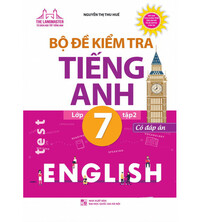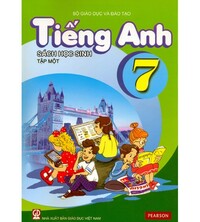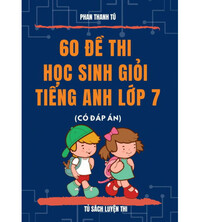Test Yourself 3 - Kiểm tra cá nhân 3
Find the word with a different sound in the underlined part in each line. Tìm từ có cách phát âm khác trong các từ sau.
Bài 1
Task 1. Find the word with a different sound in the underlined part in each line. (1 p)
Tìm từ có cách phát âm khác trong các từ sau.
1. A. ahead
B. bread
C. pleasant
D. seat-belt
2 A. ways
B. days
C.says
D. stays
3. A. obey
B. key
C. grey
D. survey
4. A. staved
B. washed
C. filled
D. annoyed
5. A. embarrassed
B. crowded
C. excited
D. divided
1. D;Key - Đáp án:
Giải thích: Chọn D. seat-belt vì âm "ea" phát âm là /i:/ trong những từ còn lại được phát âm là /e/.
2. C;
Giải thích:Chọn c. says vì âm "ay" được phát âm là /ei/ trong những từ gạch dưới còn lại được phát âm là /ei/
3. B;
Giải thích:Chọn B. key vì âm "ey" được phát âm là /i:/ còn những từ gạch dưới còn lại được phát âm là /ei/.
4. B;
Giải thích: Chọn B. washed vì âm "ed" được phát âm là /t/ còn những từ gạch dưới còn lại được phát âm là /d/.
5. A
Giải thích: Chọn A. embarrashed vì âm "ed" được phát âm là /t/ còn những âm còn lại được phát âm là /id/.
Bài 2
Task 2. Find the word with a different stress pattern from the others in each line. (1 p)
Tìm từ có trọng âm khác các từ còn lại.
|
1. A. traffic |
B. dancer |
C. cycling |
D. balloon |
|
2. A. central |
B. gripping |
C. complete |
D. boring |
|
3. A. obey |
B. enter |
C. answer |
D. listen |
|
4. A. station |
B. healthy |
C.safety |
D. alone |
|
5. A. tidy |
B. compete |
C. extend |
D. mistake |
Giải thích: Chọn D. bal’loon, vì những từ còn lại: A. ‘traffic, B. 'dancer, C. 'cycling.
Giải thích:Chọn C. com’plete vì nhũng từ còn lại: A 'central; B. 'gripping; D. ‘boring.
Giải thích:Chọn A. o’bey vì những từ còn lại: B. 'center; C. 'answer; D. 'listen.
Giải thích:Chọn D. a'lone vì nhũng từ còn lại: A. 'station; B. 'healthy; C. 'safety.
Giải thích:Chon A. ‘tidy vì những từ còn lại: B. com'plete; c. ex'tend; D. mis’take.
Bài 3
1. Does vour bike ever__ down on the way to school?
A. break B.take C. do D. turn
2. I__ go on foot when 1 was in primary school.
A. have to to B. used C. can D. may
3. Give a__ before you turn left or right.
A. sign B.tum C. sound D. signal
4. A lot of dancers go to Rio de Janeiro to__ the Rio Carnival.
A. join B. perform C. attend D. appear
5. I had to stand in the balcor. to cato the whole___ of the parade.
A. view B. picture C. sight D. vision
6. Evervbody attends the festival____ fun.
A. with B.for C. in D. of
7. On Thanksgiving, families and friends_____ to have a feast.
A. meet B. arrive C. gather D. appear
8. The end of the film was so____.
A. moved B. moving C. move D. moveable
9. Although they spent a lot of money on the film, it wasn'nt a big____.
A. success B.failure C. performance D. show
10. ___the film was gripping Tom slept from beginning to end.
A. However . Although C. In spite of D. Despite
1. A;
Đáp án: Does vour bike ever break down on the way to school?
Giải thích: break down (hỏng hóc)
Tạm dịch: Xe đạp của bạn từng hỏng trên đường đến trường phải không?
2. B;
Đáp án: I used to go on foot when 1 was in primary school.
Giải thích: used to + V nguyên thể ==> diễn tả 1 thói quen trong quá khứ
Tạm dịch: Tôi từng đi bộ khi tôi còn học tiểu học.
3. D;
Đáp án: Give a signal before you turn left or right.
Giải thích: signal (tín hiệu)
Tạm dịch: Đưa ra tín hiệu trước khi bạn rẽ trái hoặc phải.
4. C;
Đáp án: A lot of dancers go to Rio de Janeiro to attend the Rio Carnival.
Giải thích: to V (mục đích)
Tạm dịch: Nhiều vũ công đến Rio de Janeừo để tham gia lễ hội hóa trang Rio.
5. A;
Đáp án: I had to stand in the balcor. to cato the whole view of the parade.
Giải thích: view of (quang cảnh của)
Tạm dịch: Tôi đã phải đứng ở ban công để xem được toàn cảnh buổi diễu hành.
6. B;
Đáp án: Evervbodv attends the festival for fun.
Giải thích: for fun (để giải trí)
Tạm dịch: Mọi người tham gia lễ hội để vui chơi
7. C;
Đáp án: On Thanksgiving, families and friends gather to have a feast.
Giải thích: gather (tập hợp)
Tạm dịch: Vào ngày Lễ Tạ ơn, các gia đình và bạn bè tụ tập nhau ăn tiệc.
8. B;
Đáp án: The end of the film was so moving
Giải thích: moving (cảm động)
Tạm dịch: Cuối phim thật cảm động.
9. A;
Đáp án: Although they spent a lot of money on the film, it wasn'nt a big success
Giải thích:
Đằng trước là tính từ ==> cần 1 danh từ để đảm bảo cấu trúc cụm danh từ
success (thành công)
Tạm dịch: Mặc dù họ dành nhiều tiền cho bộ phim, nhưng nó không phải là một thành công lớn.
10. B
Đáp án: Although the film was gripping Tom slept from beginning to end.
Giải thích: chỉ mối quan hệ đối lập giữa hai thông tin trong cùng một câu ==> although
Tạm dịch: Mặc dù phim hấp dẫn, nhưng Tom đã ngủ từ đầu đến cuối.
Bài 4
________ A. It’s starring Will Smith. He plays a palace
guard who uncovers an alien plot to kill the Emperor.
________ B. It's a sci-fi about aliens who invade China. It
takes place along the Great Wall during the Ming Dynasty.
__________ C. Hey Nick! I'm going to see 'Attack from Planet
Q' at the Odeon theatre. Do you want to come?
________ D. Who's in it?
________ E. Critics say it's frightening and entertaining. It
won'Best Film'at the Cannes Film Festival.
________ F. Why don't we catch the 8:30 so that we can eat
something before we go?
________ G. What's that about?
________ H. What do critics say about it?
________ I. Showtimes are at 6.45 and 8.30.
________ J. OK. Let's see that. What time does it start?
Đáp án:
1. C;
2. G;
3. B;
4. D;
5. A;
6. H;
7. E;
8. J;
9. I;
10.F
Tạm dịch:
C. Chào Nick! Mình sẽ đi xem phim "Attack hom Planet Q" ở nhà hát Odeon. Bạn có muốn đến không?
G. Nó nói về gì?
B. Nó là một phim khoa học viễn tưởng về người ngoài hành tinh xâm lược Trung Quốc. Nó diễn ra ở Vạn Lý Trường Thành trong đời nhà Minh.
D. Có ai trong phim đó?
A. Nó có ngôi sao Will Smith đóng. Anh ấy đóng vai một nhân viên bảo vệ cung điện, người phát hiện ra một âm mưu của người ngoài hành tinh muốn giết vua.
H. Những nhà phê bình nói gì về nó?
E. Những nhà phê bình nói rằng nó thật đáng sợ và mang tính giải trí. Nó giành được giải "Phim xuất sắc nhất" ở Liên hoan phim Cannes.
J. Được, chúng ta hãy xem nhé. Mấy giờ phim bắt đầu?
I. Giờ chiếu lúc 6:45 và 8:30.
F. Tại sao chúng ta không xem suất 8:30 để mà chúng ta có thể ăn cái gì đó trước khi đi?
Bài 5
Task 5. Read the text and choose the correct answer A, B, C, or D for each of the gaps. (1 p)
Đọc đoạn văn sau và chọn đáp án đúng A, B, C hoặc D cho mỗi chỗ trống.
SAFETY TIPS FOR BUS PASSENGERS
Always maintain a queue while waiting (1) ____a bus. Never stand on queue on the middle of the road. At the time of boarding a bus do not try to run or chase the bus. Once you are inside the bus, (2)___ a seat and hold firmly on the handrail if you are standing.
Never try to (3)____ an overcrowded bus.
Avoid (4)_____ inside of a bus because your high-pitch noise may distract the attention of the driver and it could lead to a major(5) accident.
|
1. A. for |
B. to |
C. on |
D. in |
|
2. A. hold |
B. sit |
C. take |
D. find |
|
3. choose |
B. go |
C. wait |
D. board |
|
4. shout |
B. shouting |
C. to shout |
D. shouts |
|
5. road |
B. way |
C. path |
D. street |
1. A;
Đáp án: Always maintain a queue while waiting for a bus.
Giải thích: wait for (chờ đợi điều gì)
2. C;
Đáp án: Once you are inside the bus, take a seat and hold firmly on the handrail if you are standing.
Giải thích: take a seat (lấy chỗ ngồi)
3. D;
Đáp án: Never try to board an overcrowded bus.
Giải thích: board (lên xe)
4. B;
Đáp án: Avoid shouting inside of a bus because your high-pitch noise may distract the attention of the driver
Giải thích: avoid + Ving (tránh làm gì)
5. A
Đáp án: and it could lead to a major road accident.
Giải thích: road (đường bộ)
Tạm dịch:
NHỮNG MẸO AN TOÀN CHO HÀNH KHÁCH ĐI XE BUÝT
Luôn đi theo hàng khi chờ xe buýt. Không bao giờ đứng vào hàng giữa đường. Lúc lên xe buýt, đừng cố gắng chạy hoặc đuổi theo xe. Khi bạn ở trên xe, ngồi xuống và nắm nhẹ tay cầm nếu bạn đứng. Đừng bao giờ cố gắng đi xe buýt quá đông. Tránh la hét bên trong xe bởi vì tiếng ồn cường độ cao có thể làm phân tâm sự chú ý của tài xế và dẫn đến tai nạn đường bộ nghiêm trọng.
Bài 6
I'll never forget my visit to Hong Kong. When I arrived, everybody was very busy with preparations involved. The atmosphere was fantastic. There were bright colours and delicious smells everywhere. The local people were cleaning every corner of their houses and decorating the walls with red pieces of paper.
Another custom is to cook fish on New Year's Ever and eat the next day. My friend told me that they wanted to have something to eat on the first day of the year.
I was really looking forward to New Year's Eve Dinner. The whole family got together and everyone was really happy. I noticed that the grandparents and parents gave children red envelopes with money inside. After dinner they all started playing cards for good luck. Nobody went to sleep before midnight. At midnight the great event begins: fireworks! I was really amazed. All around the city I could see and hear colourful fireworks. It was incredible and I was really excited.
|
|
T |
F |
|
1. The local people decorated the corners of their houses with red pieces of paper. |
|
|
|
2. People cooked fish to eat on New Year's Eve.
|
|
|
|
3. The parents and grandparents gave their children red envelopes |
|
|
|
4. People didn't go to bed before midnight.
|
|
|
|
5. The card games began at midnight.
|
|
|
Key - Đáp án:
1. F;
Giải thích: The local people were cleaning every corner of their houses and decorating the walls with red pieces of paper.
2. F;
Giải thích: Another custom is to cook fish on New Year's Ever and eat the next day. My friend told me that they wanted to have something to eat on the first day of the year.
3. T;
Giải thích: I noticed that the grandparents and parents gave children red envelopes with money inside.
4. T;
Giải thích: Nobody went to sleep before midnight.
5. F
Giải thích: After dinner they all started playing cards for good luck.
Tạm dịch:
Tôi sẽ không bao giờ quên chuyến thăm của mình đến Hồng Kông. Khi tôi đến, mọi người rất bận rộn với việc chuẩn bị. Không khí rất tuyệt. Có những màu sáng và những mùi vị thơm ngon khắp mọi nơi. Người địa phương đang làm sạch mọi góc trong nhà và trang trí những bức tường với những loại giấy đỏ khác nhau.
Một thủ tục khác là nấu món cá vào đêm giao thừa và ăn vào ngày hôm sau. Bạn tôi đã nói với tôi rằng họ muốn có thứ gì đó để ăn vào ngày đầu năm.
Tôi thật sự mong chờ bữa tối giao thừa. Cả gia đình quây quần và mọi người rất vui. Tôi để ý rằng ông bà và ba mẹ đều cho trẻ con bao lì xì đỏ có tiền bên trong. Sau bữa tối, mọi người bắt đầu chơi bài để gặp điều may. Không ai đi ngủ trước nửa đêm. Lúc nửa đêm, một sự việc lớn xảy ra: pháo hoa! Tôi thật sự rất thích. Khắp thành phố tôi có thể thấy và nghe được tiếng pháo hoa đầy màu sắc. Nó thật ngoài sức tưởng tượng và tôi thật sự hào hứng.
Bài 7
Task 7. Read the text and answer the questions that follow. (1 p)
SHROVE TUESDAY
The French call this day ’Mardi Gras’, which means ’Fat Tuesday’, because they had to use up any fatty food (such as milk, eggs and butter). To do this, they made crepes-thin pancakes which you roll up and eat with sugar. Today they still celebrate Mardi Gras by eating crepes.
In Italy, Shrove Tuesday is called 'Carnevale', which means 'goodbye to meat' and gives us the word Carnival. People eat fritters (special fried pastries), and in Naples they have a pasta dish called Grande Lasagne di Carnevale. The most famous Carnival is in Venice, where people in expensive costumes and handmade masks go to fashionable parties and dances.
In New Orleans, USA, the whole carnival season is called Mardi Gras, because it ends on ShroveTuesday - but it starts on 6 January! There are fancy-dress parties, street parades and food. Traditionally, everyone eats King Cakes, which are round cakes covered in purple, green and gold sugar, with a tiny baby doll hidden inside the cake.
1. Why do the French call Shrove Tuesday ’Mardi Gras’, which means ’Fat Tuesday’?
___________________________
Đáp án: Because they had to use up any fatty food (such as milk, eggs and butter).
Giải thích: The French call this day ’Mardi Gras’, which means ’Fat Tuesday’, because they had to use up any fatty food (such as milk, eggs and butter).
2. What do Italians call ShroveTuesday?
___________________________
Đáp án: They call it 'Carevale'.
Giải thích: In Italy, Shrove Tuesday is called 'Carnevale', which means 'goodbye to meat' and gives us the word Carnival.
3. What do Italians eat at Carnival?
___________________________
Đáp án: They eat fritters (special fried pastries).
Giải thích: People eat fritters (special fried pastries), and in Naples they have a pasta dish called Grande Lasagne di Carnevale.
4. Where is the most famous Carnival in Italy?
___________________________
Đáp án: It is in Venice.
Giải thích: The most famous Carnival is in Venice, where people in expensive costumes and handmade masks go to fashionable parties and dances.
5. What is the King Cake like?
___________________________
Đáp án: It is a round cake ; coverd in purple, green and gold sugar, with a tiny baby doll hidden inside it.
Giải thích: Traditionally, everyone eats King Cakes, which are round cakes covered in purple, green and gold sugar, with a tiny baby doll hidden inside the cake.
Tạm dịch:
NGÀY THỨ BA XƯNG TỘI
Người Pháp gọi ngày này là: "Mardi Gras", có nghĩa là "Ngày thứ Ba béo", bởi vì họ phải ăn hết bất cứ thức ăn béo nào (như là sữa, trứng và bơ). Để làm điều này, họ phải làm những bánh crepe - loại bánh mỏng mà bạn cuộn tròn và ăn với đường. Ngày nay họ vẫn tổ chức Mardi Gras bằng việc ăn bánh crepe.
Ở Ý, ngày thứ Ba Xin tội được gọi là "Camevale", mà có nghĩa là "Tạm biệt thức ăn" và mang đến cho chúng ta từ Camival. Người ta ăn bánh rán (loại bánh ngọt được chiên đặc biệt) và ở Naples, họ ăn món pasta được gọi là Grande Lasagne di Camevale. Lễ hội Carnival nổi tiếng nhất là ở Venice, nơi mà những người trong trang phục đắt tiền và đeo mặt nạ tự làm đi đến những bữa tiệc thời trang và nhảy múa.
Ở New Orleans, Mỹ, mùa carnival dược gọi là Mardi Gras, bởi vì nó kết thúc vào Ngày thứ Ba Xưng tội, nhưng nó bắt đầu vào ngày thứ 6 tháng 1! Có những bữa tiệc ăn mặc lộng lẫy, diễu hành đường phố và thức ăn. Theo truyền thống, mọi người ăn Bánh Vua, là loại bánh tròn được bao phủ bởi đường vàng, xanh và tím với một búp bê nhỏ dược giấu bên trong bánh.
Bài 8
Task 8. Rewrite the sentences, using the words given. (2 p)
Viết lại các câu sau, sử dụng từ đã cho.
1. My uncle drove carelessly some years ago, but now he doesn't. USED
Đáp án: My uncle used to drive carelessly some years ago.
Giải thích: used to + V nguyên thể ==> diễn tả thói quen trong quá khứ
Tạm dịch: Chú tôi từng lái xe bất cẩn cách đây nhiều năm.
2. The distance between Ho Chi Minh City and VungTau is about 120 km. IT
Đáp án: It is about 120 km from Ho Chi Minh City to VungTau.
Giải thích: It is + distance from N1 to N2 (xa bao lâu từ vị trí này đến vị trí kia)
Tạm dịch: Từ Thành phố Hồ Chí Minh đến Vũng Tàu khoảng 120km.
3. Although she is so young, she performs excellently. AGE
Đáp án: Despite/In spite of her young age, she performs excellently.
Giải thích:
Vì đằng sau là danh từ ==> Despite/ In spite of
Tạm dịch: Mặc dù trẻ tuổi, nhưng cồ ấy trình diễn rất xuất sắc.
4. What's the distance between New York City and Boston? FAR
Đáp án: How far is it from New York City to Boston?
Giải thích: Sử dụng từ để hỏi how far ==> hỏi về khoảng cách
Tạm dịch: . Từ Thành phố New York đến Boston bao xa?
Đáp án: Critics were disappointed at his performance as King Lear.
Giải thích: be disappointed at (thất vọng về gì)
Tạm dịch: Những nhà phế bình đã thất vọng với diễn xuất vua Lear của anh ấy.
Search google: "từ khóa + timdapan.com" Ví dụ: "Test Yourself 3 - Kiểm tra cá nhân 3 timdapan.com"







